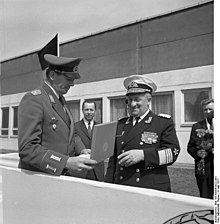Gerhard Baumann (musician)

Gerhard Baumann (born September 3, 1921 in Klein Rogahn , Mecklenburg ; † November 7, 2006 ) was a German military musician . For 24 years he was chief conductor of the Central Orchestra of the National People's Army (NVA).
Life
From 1936 to 1940 Baumann attended the music school in Malchow (Mecklenburg) . In 1940 he was drafted into the Wehrmacht and served as a military musician in the Air Force until 1945 .
Released from American captivity , he returned to his homeland and in 1947 became a member of the German People's Police (DVP). He worked as a musician and arranger of the police orchestra of the Mecklenburg-Western Pomerania State Police, which was set up by Albrecht Stern in early 1948, and studied composition and conducting . In 1953 he became chief conductor of the Schwerin Police Orchestra . From 1954 he directed the Leipzig Radio Brass Orchestra, from which the Saxon Wind Philharmonic emerged .
His friend (and later deputy) Ernst Rembach referred him to the Central Orchestra of the NVA in August 1959. As chief conductor he became an important arranger , composer , conductor and music teacher . At Hans Felix Husadel oriented, Baumann was the symphonic wind music . His students Klaus-Peter Bruchmann , Gerhard Tittel and Heinz Weitzendorf thanked him with arrangements and compositions .
On the occasion of the 13th anniversary of the NVA, he was promoted to colonel on March 1, 1969 . The culture minister of the GDR , Hans-Joachim Hoffmann , appointed him general music director on October 4, 1973 . In 1981 he conceived the Great Zapfenstreich of the National People's Army . On November 18, 1983, he was released from active military service and Heinz Häcker was introduced as the new head of the NVA's central orchestra by the deputy head of the political headquarters of the NVA, Lieutenant General Ernst Hampf . As before, he was a permanent guest conductor of the RBO Leipzig. After the fall of the Berlin Wall, he mainly worked as a composer and arranger .
When the Berlin Airlift was 50 years ago, he took part in the major military music event Berlin says thank you in the Olympic Stadium . Six music corps played.
In November 2006 he died of illness in Berlin
Awards
- 1971 Theodor Körner Prize
- 1977 National Prize of the GDR III. Art and literature class
Works
Works for wind orchestra (selection)
- Berlin melodies
- Berlin swing
- Berlin medley
- Berlin - City of Peace (Festfanfare)
- Parade march
- John Philip March
- In the regiment next door (march)
- Sounds of friendship (potpourri of songs and dancers from the Warsaw Treaty states )
- Marcia historica (potpourri)
- March to the Great Guard Elevator or Der Bodensteiner
- Mecklenburg Land (March)
- Mecklenburg capriccio
- Oberbrambach March
- Parade fanfare
- Friendship Parade (March)
- Salut the four gates (concert march)
- Waterkant Medley
literature
- Günther Buch: names and dates. Biographies of important people in the GDR. Dietz, Berlin (West) / Bonn-Bad Godesberg 1973, ISBN 3-8012-0020-5 , p. 14.
- Bernd Zivny: On the death of Gerhard Baumann. In: With sounding game. Military music - then and now 4/06, pp. 25–26.
Web links
- Literature by and about Gerhard Baumann in the catalog of the German National Library
- Literature about Gerhard Baumann (musician) in the state bibliography MV
- A recommendation for friends of military music (private website)
- Berlin medley on YouTube , recorded by the Central Orchestra of the NVA; Head: Colonel GMD Gerhard Baumann.
- Parade of Friendship on YouTube , recorded by Military Music Carinthia; Head: Lieutenant Colonel Sigismund Seidl.
- Salute to the four gates on YouTube , recorded by Heeresmusikkorps 14, Neubrandenburg ; Head: Major Wolfgang Helm.
Individual evidence
- ↑ a b Gerhard Baumann (private website)
- ↑ a b c Obituary by Bernd Zivny
- ↑ Neues Deutschland , April 25, 1969, p. 8.
- ↑ Neues Deutschland , October 5, 1973, p. 4.
- ↑ Neues Deutschland , November 19, 1983, p. 7.
| personal data | |
|---|---|
| SURNAME | Baumann, Gerhard |
| BRIEF DESCRIPTION | German military musician and conductor |
| DATE OF BIRTH | September 3, 1921 |
| PLACE OF BIRTH | Klein Rogahn , Mecklenburg |
| DATE OF DEATH | November 7, 2006 |